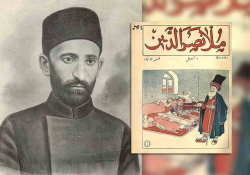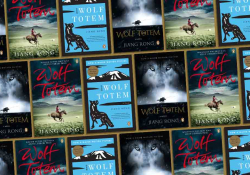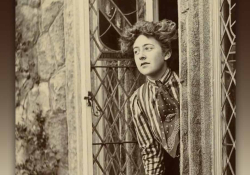The Translation Workshop: Are Thirty Hands Better Than Two?
Zack Rogow and students from the Norman Public Schools | Fred Jones Jr. Museum of Art | April 2, 2015. Photos: Daniel Simon
In a recent essay for WLT, Hungarian writer Zsolt Láng muses on writing—and playing—together: “Writing together has neither an official nor a nickname. For want of a better term, they call it writing for four hands, writing for two hands (after all, only one plus one hand is engaged in it), or simultaneous writing. . . . The one to compose the most for four hands was Robert Schumann, and it is his exhortation that is echoed by teachers encouraging their students to engage in four-handed play: ‘Do not miss any opportunity to play music with others. Only so will your playing become fluent and vigorous’” (“Ping-Pong; or, Writing Together,” trans. Erika Mihálycsa, Jan. 2015).
By analogy, translating together provides a wonderful opportunity for developing a “fluent and vigorous” style. In recent years, the most successful example of “four-handed” translation comes from Richard Pevear and Larissa Volokhonsky, whose prizewinning translations of Russian classics have inspired a new generation of readers. But do too many hands spoil the proverbial stew? Fourteen advanced French students from the Norman Public Schools recently put that adage to the test.[1]
During a day-long translation workshop with poet, playwright, and translator Zack Rogow, the students spent the morning discussing various translations of Arthur Rimbaud’s “Ma Bohème,” and in the afternoon he challenged them to translate Armand Robin’s “Quarante Vies” (1940), which has never before appeared in English.[2] Working in small groups, they divided up the poem, taking a line-by-line approach. Here is their collective result:
Forty Lives
by Armand Robin
I live as if I have forty lives
Where I explore,
Where I destroy dense destinies one after another,
Where I find times far from my years,
Where I get lost.
Cloud, straying in the sky,
Stream of grass in grass flowing by,
Hurrying yet endlessly refreshed,
I flee from life to life.
Brawling bodies battling all forty lives!
My flesh replaced by hardened strangers,
Me by myself removed, replaced
By other more imposing inhabitants
My life without me could be replaced
By a life where I will be.
I will extend beyond time,
I make myself as I shift and drift.
Although all the students came into the workshop passionate about expanding their knowledge of French, few knew what to expect, and most feared the difficulty involved in the task of translation. Reading the Rimbaud poem together, they were surprised by the many different possible versions of a single original, and they soon realized that translating for literal sense while at the same time striving for poetic sensibility proved to be a difficult balancing act: changing a single word could affect the entire translation.
Norman High student Anna Wade’s comments on the experience were emblematic: “This field trip surprised me in the best possible way. I came into the workshop expecting to expand my knowledge of the French language through translation. But it was so much more than that. The workshop was engaging and fun, but it still allowed me to gain useful tools to further my understanding and appreciation of the language.” And Norman North senior Haley Prieto offered her own perspective: “From the workshop I learned how difficult it really is to be a translator. To be good at it, meaning and feeling must be conveyed, not just words, in order to fully comprehend what is being said.”
The Romantic myth of the solitary poet, wandering alone on the moor—or a bohemian poète maudit like Rimbaud, trudging through the muddy Ardennes—continues to color our perceptions of the creative writer. And by the very nature of their work, most translators toil in solitude. However, when it comes to the translation workshop, the labor of many hands offers rich opportunities for collaborative learning.
Editorial note:
Professor Rogow’s visit to Oklahoma was sponsored by the OU College of Arts & Sciences and Department of Modern Languages, Literatures & Linguistics; the Mark Allen Everett Poetry Series; the Norman Public Schools; the Oklahoma Humanities Council and the National Endowment for the Humanities; and World Literature Today. Special thanks to Brook Meiller, Janet Gorton, and Melinda Minshall for helping coordinate the workshop.
Footnotes:
[1] From Norman High School: Megan Corbly, Caleb Hennigan, Oliver Holden-Moses, Allison Miller, Alonna Nellis, Marlena Roppolo, Halla Tumberlinson, Taylor Vanderburg, and Anna Wade. From Norman North High School: Hailee Butts, Haley Prieto, Michael Robison, Laini Ryan, and Drew Thompson.
[2] Robin (1912–1961) reputedly understood twenty-six languages. During World War II, he was pressed into service by the Nazis to gather intelligence from foreign radio broadcasts, then secretly performed a similar service for the Resistance. Best known as a poet, Robin was also a prolific translator, including works from English (Shakespeare), Russian (Pasternak), Chinese (Du Fu), and others. Robin’s translations of the Italian poet Giuseppe Ungaretti were featured in a collection entitled Vie d’un homme (1973), which also included translations by some of the most prominent French poets of the late twentieth century: Philippe Jaccottet, Pierre-Jean Jouve, Jean Lescure, André Pieyre de Mandiargues, and Francis Ponge. “Quarante Vies” appears in Ma vie sans moi, suivi de Le monde d’une voix (Gallimard, 1970).















